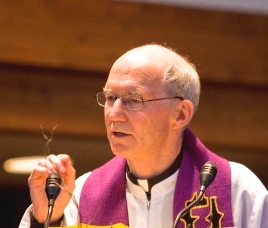This is the third of five homilies on missionary discipleship. We began with the example of Andrew. Jesus calls him: Come and you will see. Andrew then goes to his brother Simon Peter with this news: We have found the Messiah - the one who fulfills our longing.
Jesus, we saw, is the Lamb of God. He takes our sin and guilt upon himself, gives us a new beginning: repent and believe in the Gospel. We'll have those very words in two and half weeks when we receive ashes on our foreheads. Repent and believe in the Gospel.
This Sunday we ask the question: Why should we repent? Why should we believe? Why should we follow Jesus? To many people Jesus is a moral teacher along with Socrates, Confucius and the Buddha. So what? There are thousands of them, throughout history and even in our modern world. What makes Jesus different?
We have the answer today. Jesus has authority. We follow Jesus because he has authority. About twelve centuries before Jesus, God promised he would raise up a prophet like Moses. You remember Moses - he gave the covenant, the law and the commandments. Jesus is the New Moses. He gives a new covenant, a new law, a new commandment. Jesus has authority.
Some of you might wonder what exactly does authority mean. It comes from the Latin "auctor" - author, originator. Jesus has authority because he is the originator. On Christmas day we heard: In the beginning was the Word and Word was with God and the Word was God...the Word became flesh and dwelt among us. Jesus is the Word made flesh. As we say, true God and true man.
That's why Jesus can command the demons. They are creatures made by God. For sure they have gone awry and do much harm. They use their freedom to oppose God. But ultimately they are creatures of God. So Jesus can say to them, "Quiet. Come out of him." Jesus has the full authority of God. He is God.
Jesus stands in a category apart from Socrates, Confucius, the Buddha or any great moral teacher. We can learn from them and admire them. I esteem Socrates but I do not have a living personal relationship with him - unless someday we meet in the Communion of Saints. So it is with all great teachers.
Jesus on the other hand invites us this very day to an encounter - to enter a relationship with him, the most important relationship you will have with any person.
Today we see Jesus' authority. He is the author, the originator. He calls us to become missionary disciples. Before him we face a choice. In the words of our Psalm, "If today you hear his voice, harden not your hearts." Amen.

 RSS Feed
RSS Feed
